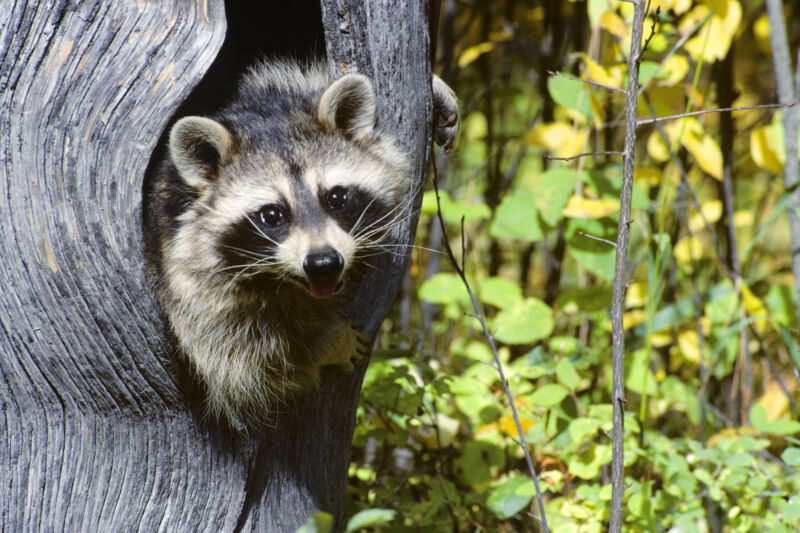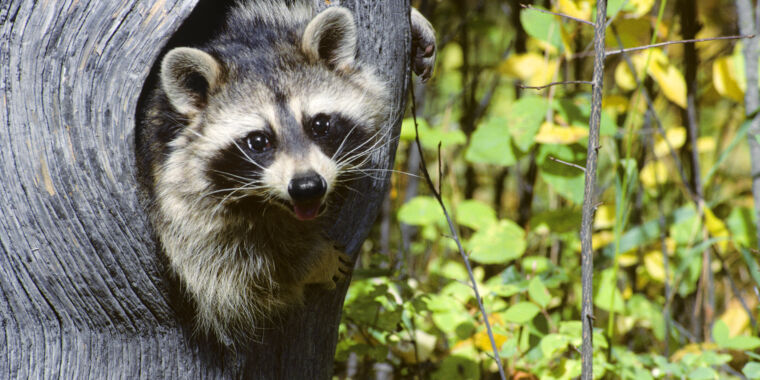
If you've been looking for a reason to have a flamethrower in your home, you've just found one.
This week, the Los Angeles County Health Department reported that two people were infected with a raccoon parasite that causes serious, often fatal, infections of the eyes, internal organs and central nervous system. Those who survive are often left with serious neurological consequences, including blindness, paralysis, loss of coordination, seizures, cognitive impairment and brain atrophy.
The parasitic roundworm behind the infection is called Baylisascaris-procyonisspreads via eggs in the feces of raccoons. Adult worms live in the intestines of the masked garbage collectors, and each female worm can produce nearly 200,000 eggs per day. Once in the environment, these eggs can remain infectious for years. They can survive desiccation, as well as most chemical treatments and disinfectants, including bleach.
People become infected when they inadvertently eat soil or other material that has been contaminated with egg-laden feces. Although infections are rare—there were 29 documented cases between 1973 and 2015—younger children and people with developmental disabilities are at greatest risk.
For example, an 18-month-old boy with Down syndrome in Illinois died from the infection after chewing and sucking pieces of infected firewood bark. An autopsy later found three worm larvae per gram of brain tissue, for a total estimated burden of 3,027 parasitic larvae, according to a 2016 report.
Burn it down
In a press release this week, the LA Health Department said the risk to the general public is “low” but that the two cases are “concerning because a large number of raccoons live in close proximity to people and the infection rate in raccoons is likely high. The confirmed cases of this rare infection are an important reminder to all Los Angeles County residents to take precautions to prevent the spread of diseases from animals to people, also known as zoonotic diseases.”
According to the Centers for Disease Control and Prevention, one of the best methods of preventing raccoon roundworms is to kill them with fire. While chemicals have little chance of killing infectious eggs, extreme heat destroys them instantly.
If there are raccoons around your property, you may want to use this method. Raccoons often defecate in communal, foul-smelling latrines, which are often located at the base of trees, on elevated surfaces such as stumps, woodpiles, decks and patios, and also in attics and garages.
If you suspect you have a raccoon latrine outside on your property, the CDC recommends dousing the area with boiling water or setting it on fire. While the CDC specifically recommends a propane torch, a personal flamethrower can also do the trick. The agency does warn that setting fire to a latrine location “may cause fire, burns, or damage to the surface.”
“Before setting fire to a latrine site, call your local fire department to learn more about local regulations and safety practices,” the CDC says. “Concrete slabs, bricks, and metal shovels or garden tools can be set on fire without damage. Do not attempt to set fire to surfaces that could melt or catch fire.”
For indoor toilets, the CDC advises against using a fire. Instead, it outlines a gentle cleaning method using hot, soapy water. However, if you prefer, any removed feces or contaminated material can be burned outdoors, as long as it is not buried or thrown in the trash.

